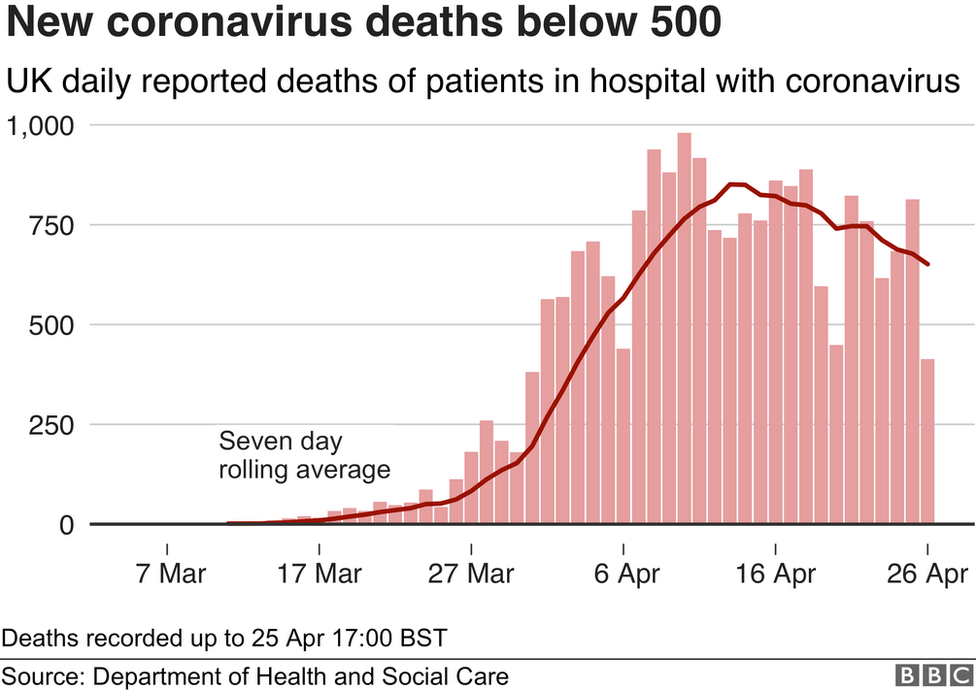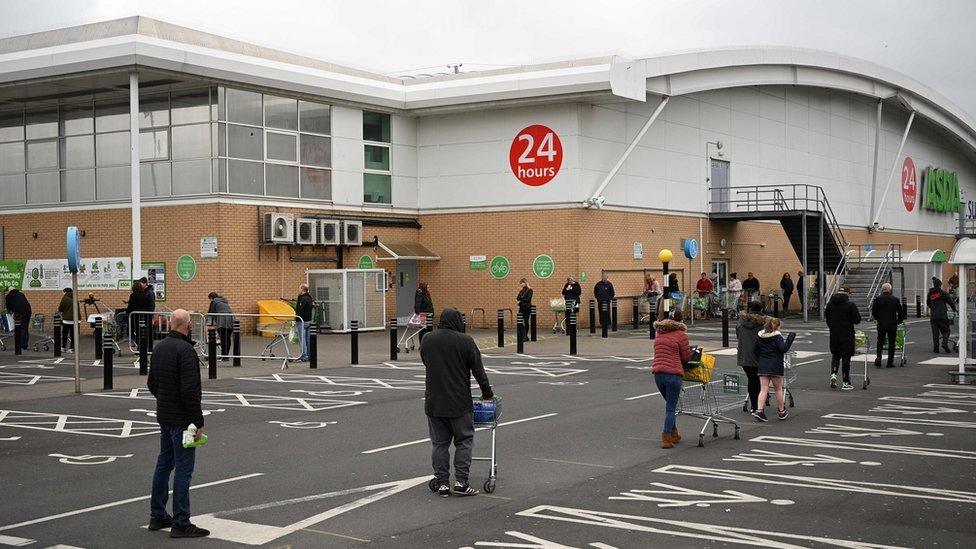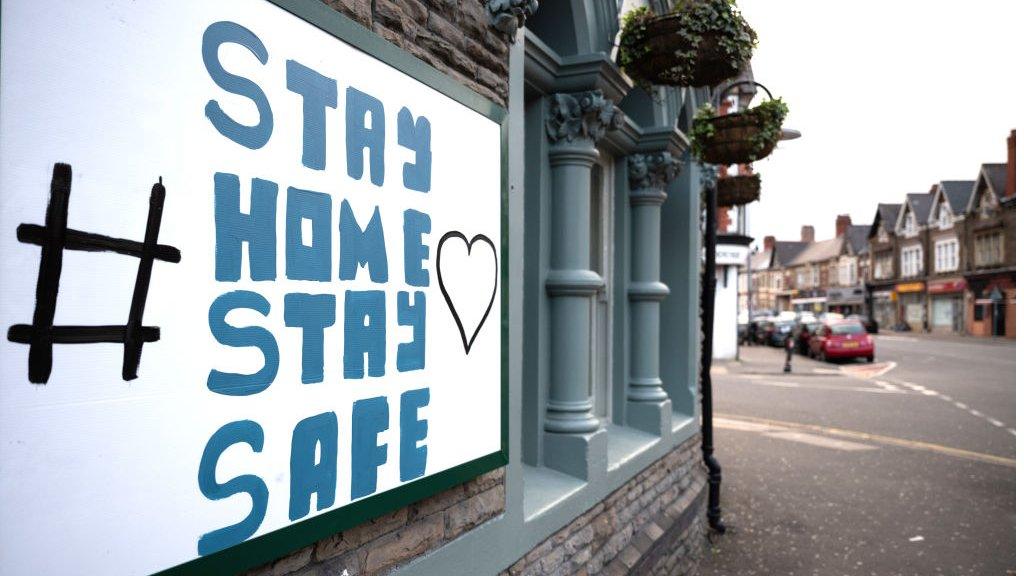Coronavirus: UK must find 'new normal' to ease lockdown - Raab
- Published
Dominic Raab: NHS staff 'have best PPE we can get them'
The UK's lockdown needs to be eased carefully, meaning social distancing will remain for "some time", Foreign Secretary Dominic Raab has said.
He described the more than 20,000 deaths in the UK as "heartbreaking", but said the toll could have been "much worse" without the strict measures.
However, Mr Raab did hint at some ways schools, sport and businesses could begin to return to "a new normal".
Meanwhile, the PM has arrived back in Downing Street to resume work.
Prime Minister Boris Johnson will chair the morning meeting of the government's coronavirus "war cabinet" on Monday, after recovering from Covid-19. It is almost a month since he was diagnosed with the virus.
A further 413 people have died with coronavirus in UK hospitals - the lowest number that has been reported in April.
However, experts have previously warned against over-interpreting daily statistics, as they often reflect reporting delays, particularly over weekends - so do not relate directly to the number of deaths that occurred on a certain day.
The latest official figures bring the total number of deaths to 20,732. The government's data does not include people who die in care homes, in their own homes, or elsewhere in the community.
The government has come under pressure from Labour to set out its "exit strategy" for lifting the lockdown.

A SIMPLE GUIDE: How do I protect myself?
AVOIDING CONTACT: The rules on self-isolation and exercise
HOPE AND LOSS: Your coronavirus stories
LOOK-UP TOOL: Check cases in your area
TESTING: Can I get tested for coronavirus?

Shadow cabinet office minister Rachel Reeves said ministers should treat people "like grown-ups" and should publish their plans for exiting the lockdown - to give businesses, schools and other organisations time to prepare.
But Mr Raab, who has been deputising for Boris Johnson while the PM recovers from coronavirus, said it would not be responsible to start announcing specific proposals until evidence was available to support them as this could risk "misleading" the public.
Rather than a complete lifting of all measures, he told BBC One's Andrew Marr Show that the country would end up "moving to a new normal".
Mr Raab said when schools reopened, social distancing measures would need to be in place for pupils and staff.
"I think it's inconceivable that they would come back without further measures, as are already being applied in those schools that are open for key workers," he said.
But he would not be drawn on a suggestion that this would mean groups of pupils returning to lessons on different days or times to keep pupil numbers down.


The death toll rising further above 20,000 is a sobering reality and brings more devastating news for bereaved families. However, the increase of 413 in daily reported deaths was the lowest since late March.
There are the usual caveats about weekend reporting of figures and there is likely to be another move up during the week when more data comes in.
But, in combination with other statistics today, it all added up to a slightly more positive picture being portrayed at the Downing Street media briefing.
New infections are not increasing even though the number of people tested is rising. The total number of patients with Covid-19 in hospitals is falling in most parts of the UK.
NHS leaders are talking of coming "through the peak". But they don't expect a steady downwards trajectory, more a slowly declining plateau.
As Professor James Naismith of Oxford University put it, "the virus takes us in an express elevator to the top of the peak but we have to find our way back down by the stairs".

Mr Raab suggested social distancing measures already being seen in food shops and other businesses that have remained operating could also be expanded to non-essential businesses if they were to reopen.
Asked whether there was any chance of people being able to play sport outside this summer, Mr Raab said this would be "difficult" due to the "level and scale of interaction".
But he added: "I think the professional sport may be different because of the scale of testing that they would be able to introduce."

On the possibility of testing people arriving at UK airports, Mr Raab said this measure might be introduced but he "can't say it with any certainty yet".
"The advice that we got - and I checked it with the scientists, with the chief medical officer - at the outset when we took up our social distancing measures, is that it wouldn't make any difference from a public health point of view," he said.
At that time, the number of people travelling was "plummeting" and "the virus was already at pace" within the UK, he added.
But he said that might need to be reviewed when the number of people with the virus in the UK had dropped significantly.
"Whether it's a quarantine period, or testing, or other measures that might be taken, it's possible - and I ask this question every week… and we will keep asking that question."

Supermarkets have remained open with social distancing measures
At Sunday's Downing Street briefing, NHS England's Medical Director, Prof Stephen Powis, said efforts by the public to follow social distancing guidelines "have begun to pay off", but stressed this would only continue if people continue to comply with the strict measures.
He said there was a "very definite" trend of a reduced number of people in hospitals - most markedly in London - and said there had been a decline in the number of critical care beds used for Covid-19 patients.
But Prof Powis insisted it was too early to ease off lockdown measures.
Rachel Reeves: "Businesses, schools and other organisations need time to plan if they are to reopen"
In his opening remarks at the government briefing, Environment Secretary George Eustice said food availability in UK supermarkets had returned to "normal levels" after a period of panic-buying at the start of the coronavirus outbreak.
Mr Eustice said the international food chain is continuing to "work well", but he said he expected there would be a need to recruit furloughed staff to harvest crops at the start of the summer.
He also dismissed reports that travellers returning to the UK will have to be quarantined as "speculation", saying "no decisions" have yet been taken on measures beyond lockdown.
Meanwhile, First Minister Nicola Sturgeon warned she could delay any lifting of the restrictions in Scotland if she thought the government at Westminster was moving too quickly.
"If... the UK government took decisions that I thought were premature in terms of coming out of the lockdown then clearly I would want to make sure that Scotland did what I judged was best to protect the population," she told the programme.
But Ms Sturgeon added she would not take a different path "for the sake of it".

How are other countries easing their lockdowns?
In Italy some businesses, such as bookshops, stationers and children's clothes stores, have already reopened on a trial basis in some parts of the country. Schools to reopen in September
Germany reopened small shops, car dealerships and bicycle stores earlier this week. The only students back in school are those sitting leaving exams. Other pupils will also begin to return to classes after the lockdown ends
Spain allowed children outside on Sunday for the first time since 14 March. The lockdown itself is to be extended until 9 May, pending parliamentary approval
France is expected to unveil details of easing restrictions on Tuesday
Belgium said schools and businesses will reopen from mid-May
Denmark allowed students under the age of 12 to return to school earlier this month

In other developments:
The military is to begin testing essential workers around the UK for coronavirus in mobile units
Trade organisations have issued new social distancing guidelines for shops to prepare for any easing of the lockdown
Care homes looking after thousands of vulnerable residents have said none of their staff has been tested for coronavirus
Birmingham's Nightingale hospital is "not being used at all" 10 days after it was opened by the Duke of Cambridge
- Published8 May 2020

- Published15 June 2020